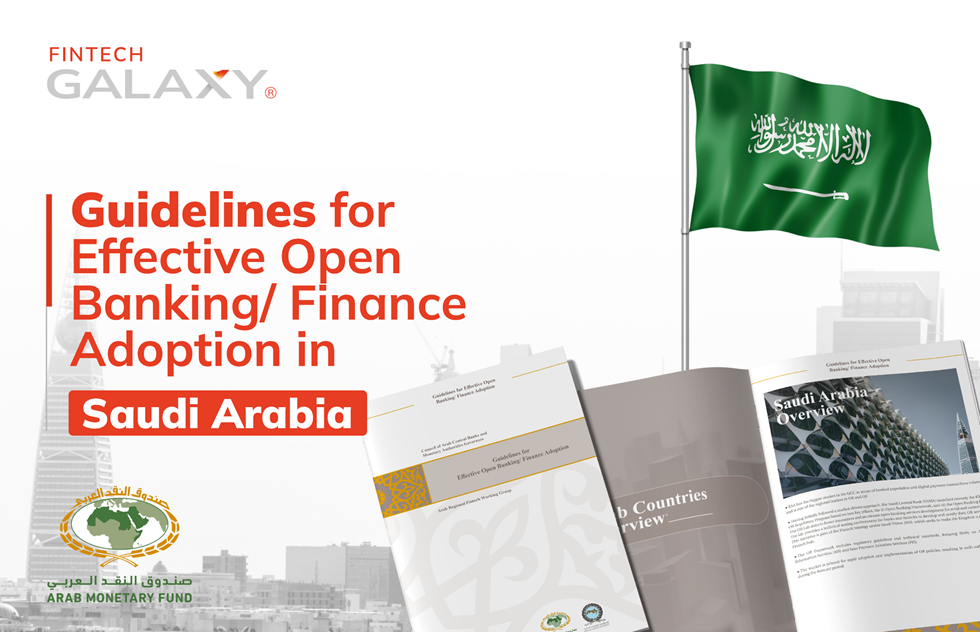We use cookies to ensue you get the best experience on our website

This is an excerpt from Guidelines for Effective Open Banking/ Finance Adoption created by the Council of Arab Central Banks and Monetary Authorities Governors, Arab Regional Fintech Working Group, Arab Monetary Fund, and Fintech Galaxy.
Open Banking (OB) is currently being transformed into a more comprehensive model, known as Open Finance (OF), which encompasses a wider range of financial services, including investments, pensions, insurance, and consumer credit. In Arab countries, open infrastructures are being developed to facilitate collaboration between financial institutions and Third-Party Providers (TPPs), encouraging data sharing and expanding the sector's capacity for innovation. Central banks play a crucial role in enacting OB regulations, ensuring data protection, promoting interoperability between market participants, and enhancing consumer benefits and financial system resilience. Authorities can leverage the potential of OB and APIs to implement an array of use cases, such as account aggregation, credit scoring services, digital identity verification, remote customer onboarding, digital lending, personal financial management, account-to-account payments for large purchases, and Buy Now Pay Later (BNPL) arrangements. Continuous improvement and adaptation are essential in this ongoing process.
Unlocking the Kingdom's Fintech Potential
Saudi Arabia stands at the forefront of the financial technology revolution in the Gulf Cooperation Council (GCC), boasting the largest market in terms of the banked population and digital payment transaction volume. With a strategic vision towards the future, the Saudi Central Bank (SAMA) has initiated a progressive Open Banking (OB) journey, underpinned by the Open Banking Regulatory Program, setting the Kingdom on a trajectory to become a global FinTech hub by 2030.
Saudi Arabia's Progressive Approach
The Open Banking journey began with the introduction of the Open Banking Policy by SAMA in January 2021, outlining a phased approach to establishing the OB ecosystem. The policy, structured into three phases, laid the foundation for the Kingdom's trajectory toward fostering financial innovation. SAMA took a significant step forward in November 2022 by issuing a comprehensive set of legislation, regulatory guidelines, and technical standards, forming the cornerstone of the Open Banking Framework. This framework, primarily focusing on Account Information Services (AIS), is designed to ensure secure, standardized, and regulated data sharing. Drawing inspiration from the European Union's PSD2, the KSA Open Banking (KSAOB) Standard was tailored to the national context. This standard introduced modifications in customer consent types, consent management, accounts endpoint, transactions endpoint, and parties' endpoint. SAMA extended parties' endpoint capabilities by leveraging OpenID Connect for robust identity verification and authentication. As an integral part of the Open Banking Regulatory Program, the Open Banking Lab serves as a technical testing environment, providing a sandbox for banks and fintechs. This innovation hub facilitates the development, testing, and certification of OB services for both retail and corporate end-users.
Saudi Arabian Perspective on Open Banking/ Finance
- In 2021, SAMA started accepting OB fintechs in a controlled environment under the regulatory Sandbox.
- Over 10 OB fintech have been permitted to operate in the Regulatory Sandbox
- The Regulatory Sandbox has evolved into an always-open model, enabling continuous testing of multiple use cases.
- Launched in 2023, the Open Banking Lab certifies market participants on the KSA Open Banking Framework, ensuring adherence to regulatory standards and fostering a culture of excellence in OB services.
- SAMA's forward-looking approach includes plans to develop Phase 2 of the Open Banking Framework, focusing on Payment Initiation, later this year.
- The ongoing development of the Open Banking Strategy and its vision and strategic phases underscore the Kingdom's commitment to staying at the forefront of fintech innovation.
From SAMA's perspective, central banks play a pivotal role in ensuring a smooth adoption of OB/OF. Central banks should proactively develop comprehensive regulatory frameworks that provide clear guidelines and standards. These frameworks should cover data privacy and security, technical infrastructure, and interoperability, among other crucial aspects. Importantly, they should ensure that banks and other financial institutions adhere to regulatory requirements.
Saudi Arabia: A Look Ahead
Saudi Arabia's journey in Open Banking exemplifies a commitment to innovation and a strategic vision for the future. As the Kingdom continues to evolve as a global Fintech hub, the guidelines outlined by SAMA provide valuable insights for other countries, emphasizing the importance of regulatory frameworks, technical infrastructure, and fostering a collaborative ecosystem. The challenges faced are not impediments but opportunities for continuous improvement and adaptation, ensuring that Saudi Arabia remains a trailblazer in the dynamic world of Open Banking.
Fintech Galaxy is a platform that facilitates secure and cost-effective connections between financial institutions and TPPs, with a focus on driving innovation and competition via Open Banking and Open Finance tools. We have secured a Sponsored TPP License with Saudi Payments and are currently in the Go-Live phase. Our personalized solutions promote financial inclusion and enable all market participants to leverage the benefits of cutting-edge tools and technology. Fintech Galaxy’s commitment to empowering businesses and individuals to achieve their financial objectives is unwavering, and we invite you to get in touch with us to learn more about how we can help you achieve yours.